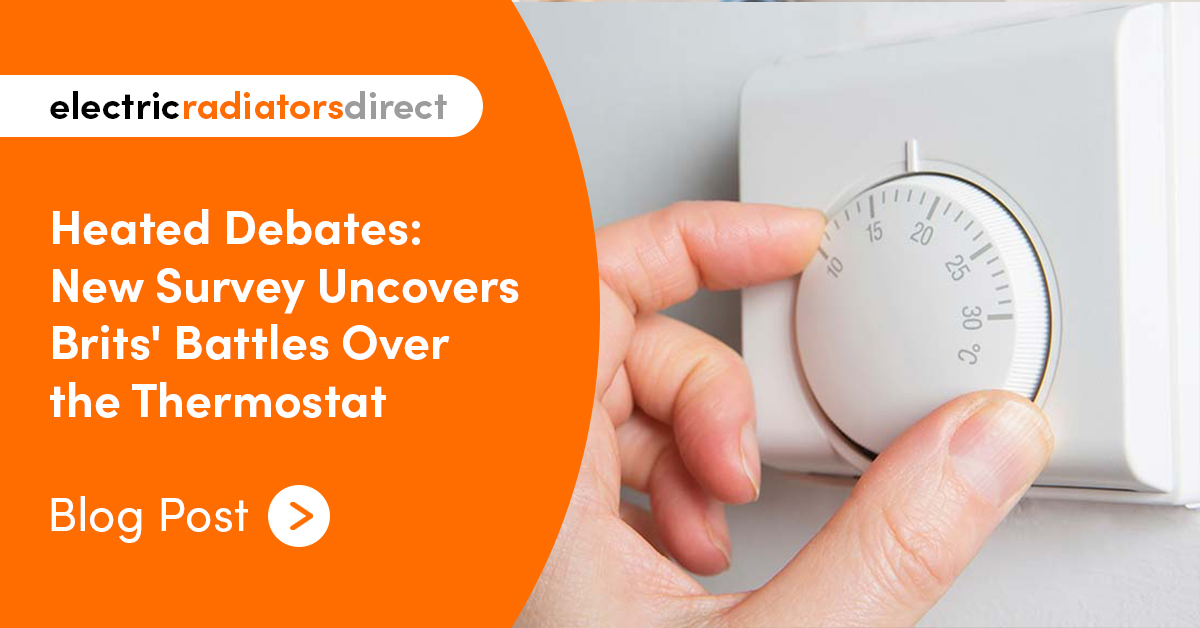As the winter chill tightens its grip, households across the UK continue to crank up their heating to stay toasty. However, it's not all smooth sailing! Navigating issues such as heating costs and temperature regulation can certainly spark debate. Our new survey delves into the heated arguments that stem from warming up your home, exposing the thermostat wars that can unfold behind closed doors.
Shockingly, over half (53%) of Brits find themselves in arguments with their partners or housemates over the simple matter of whether or not to turn the heating on. Our findings also reveal the ideal winter temperature preferences across the nation, as well as spotlighting the cities where heating debates are fiercest.
Millions of us have DAILY arguments over the heating
With a significant percentage of the nation confessing to squabbles over home heating, the question arises; just how often do we find ourselves caught up in these heated debates?
The answer is, frequently! Our survey revealed that 7% of respondents – equating to around 4.75 million people – are having DAILY disputes over simply turning on the heating. However, it’s not all doom and gloom. A third (33%) of survey respondents swear that they never argue over the thermostat at all. Sounds like bliss! And it appears the younger crowd are the ones bringing the heat, with a whopping 75% of millennials (25–34-year-olds) and 71% of feisty Gen Zs (18-to-24-year-olds) confessing to winter thermostat quarrels with their housemates or partners.
In fact, nearly a fifth (17%) of aged 18–24-year-olds admitted to having their fair share of daily arguments over firing up the heating in the colder months (between October and March). Meanwhile, the over 65s are clearly the ‘chill’ generation when it comes to heating debates, with a nearly half (48%) steering clear of arguments on this topic altogether.
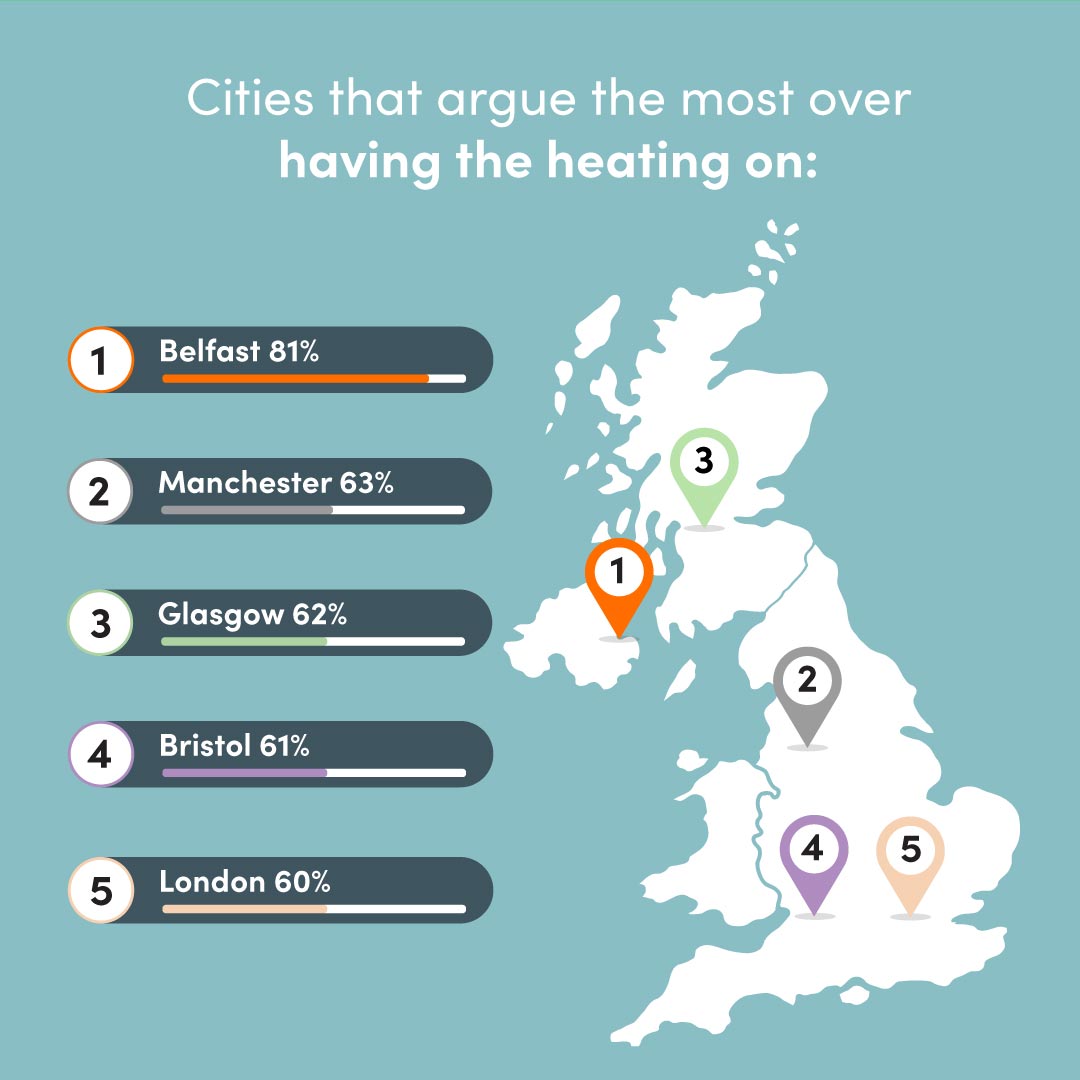

The fieriest UK cites
Surveying the impact of the 'great heating debate' across the UK, Belfast comfortably claims the title as the nation’s ‘hottest’ city with a mammoth 81% of residents admitting to having disagreements over the heating. Almost half (45%) of Belfast even claim to have these arguments at least once a week!
Manchester (63%), Glasgow (62%), Bristol (61%), and London (60%) also stand out as cities where people are prone to bickering about cranking up the radiators, with one survey respondent from London confidently declaring, "I'm the boss", when it came to home heating – no negotiating there, then!
Cities that argue the MOST over having the heating on:
- Belfast – 81%
- Manchester – 63%
- Glasgow – 62%
- Bristol – 61%
- London – 60%
Out of the 62% of Glaswegians who admit to sharing disagreements over the heating, it seems a third (33%) dive headfirst into these squabbles a few times a week, with a large chunk of Bristol (30%) and Cardiff (25%) residents seemingly doing the same.
Elsewhere, Southampton is bringing the drama on a daily basis, with 11% of residents openly confessing to sharing thermostat spats every day! London (10%) and Bristol (9%) closely followed, while on the flip side, Edinburgh residents are keeping things cool, with 61% avoiding this disagreement.
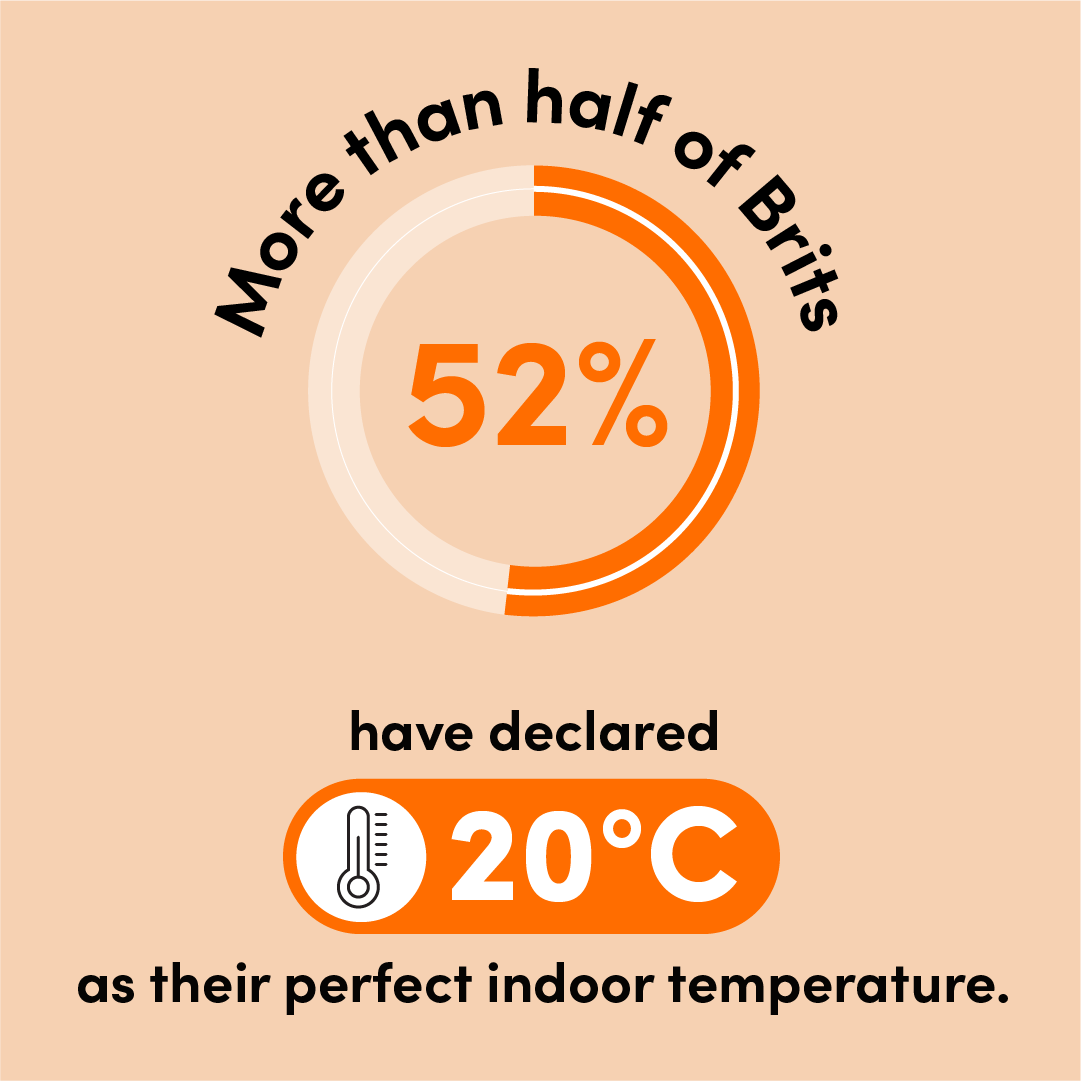

The perfect home temperature as voted by Brits
Our survey also spilled the beans on the timeless debate; what is the ideal home temperature? According to a recent Martin Lewis' Twitter poll , more than half of Brits (52%) have declared 20 °C or 21°C as their perfect indoor temperature. And while the magic number for our own survey respondents is a cosy 20°C (if there were no budget constraints, of course), a daring 16% of Brits seem to thrive in chillier surroundings, swearing by an ideal temperature of 18°C or below.
It seems that nearly a quarter (24%) of the younger generation of 18-to-24-year-olds are all about the frosty lifestyle too, opting for an ideal winter home temperature of 18 °C or below. However, the 35-44 age group seemingly love to crank up the heat, with 12% setting their thermostats to a balmy 23 °C or above – it’s practically tropical!
Looking at the regional variations across the UK, 20°C appeared to be the sweet spot for the majority of the nation, except in Birmingham, Leeds, and Norwich residents, who prefer indoor life at 21°C. And then there are the cities that like it hot – specifically Newcastle and Norwich – where over a quarter (28%) of respondents would happily splurge on a thermostat setting of 22°C or above if money were no object.
Medical professional and founder of Eye Facts, Dr. Saya Nagori, commented on the health implications of unbalanced temperatures, and why men and women may disagree over the thermostat:
“Women generally tend to feel colder than men because their bodies produce less heat. This is because women usually have slower metabolism and less muscle mass. The effects of estrogen on blood circulation also contributes to women feeling cooler, especially in their hands and feet. Due to these natural differences, it makes sense to slightly raise the thermostat to ensure everyone feels comfortably warm.
"When it comes to avoiding health implications, it's best to stick to moderate temperatures - around 20 - 25°C." - Dr. Saya Nagori
“Additionally, when it comes to avoiding health implications, it's best to stick to moderate temperatures that feel just right – around 20-25° Celsius. This helps prevent the risks of getting too cold or too hot. Spending too much time in chilly surroundings can gradually make your body temperature drop, and in extreme cases, could even lead to organ failure.
On the flip side, being in really hot conditions can lead to issues like cramps, exhaustion, or even heat stroke, as your body tries to cool down. So, finding a happy medium can help keep your body balanced and healthy.”
How to put an end to your thermostat wars
And there you have it – our survey has lifted the lid on the nation’s 'heated arguments,' as we look to navigate the last few weeks of winter chill. And with over half of Brits caught up in their own thermostat wars, it appears this age-old debate is here to stay!
For those looking for a way to put out the fire, here are some easy tips to help put an end to disagreements at home:


1. Find a temperature that works for both of you
Our survey revealed that 20°C is the nation's preferred temperature when cost is not a constraint. However, the key to resolving any potential conflict is clear and open communication with your partner or housemate, determining a temperature that accommodates both of your individual preferences. Achieving a compromise is within reach!
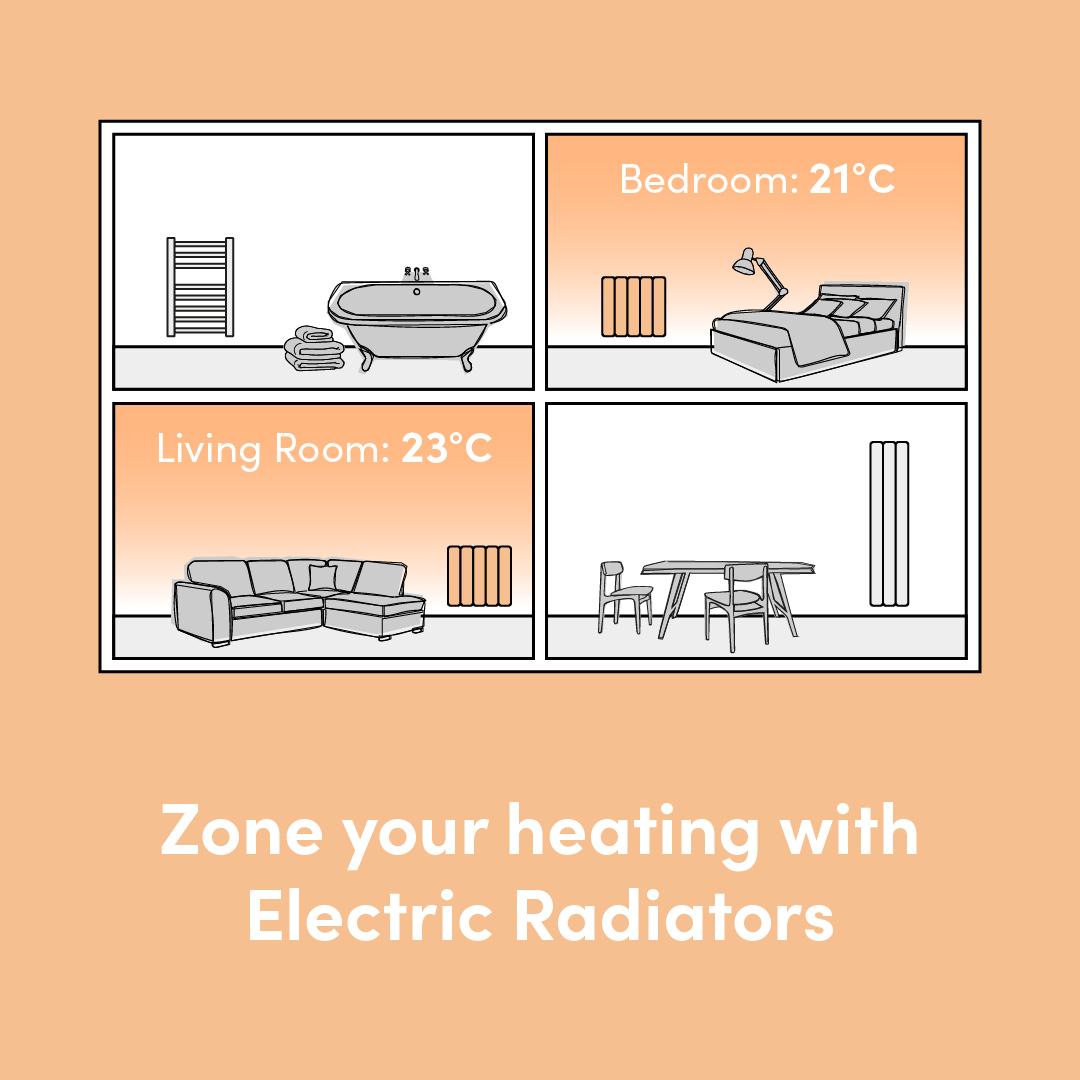

2. Try zoned heating to limit use of radiators
It's clear that heating only occupied rooms makes sense, but central heating can complicate this as an interconnected system doesn't allow independent heating of individual rooms. Electric radiators are fitted with their own precise thermostats, allowing them function independently, so you can easily tailor heating to your needs. If you're in one area of the house, you can turn off unused units, either manually or with your phone when using WiFi control. For more information on zoned heating, check out our blog post on How Zoned Heating Can Save You Money.
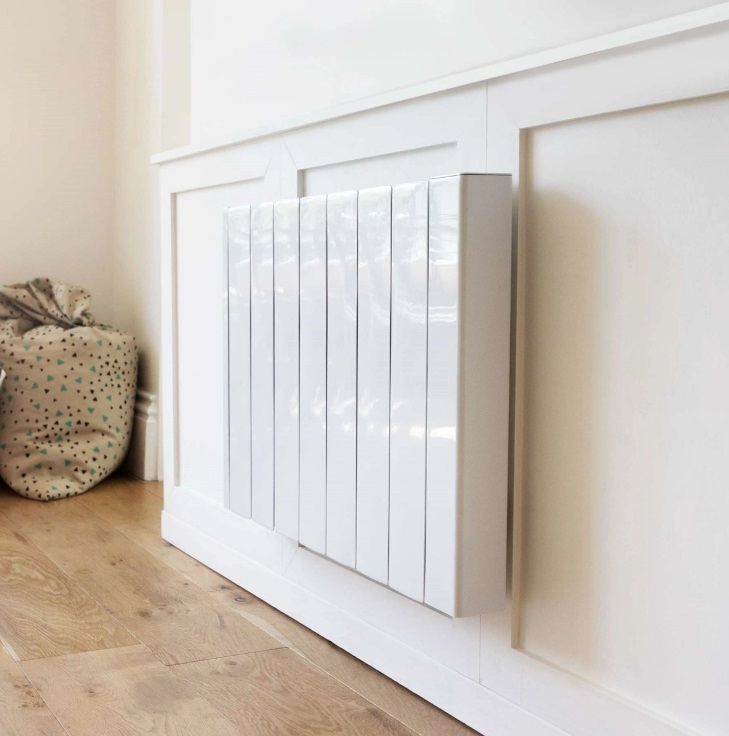

3. If cost is the main issue, switch to electric radiators for long-term savings
With many looking to reduce their energy costs at this time of year, making lasting improvements to your home's heating and insulation diminishes a dependence on gas over time. Electric radiators – such as the Ecostrad iQ Ceramic WiFi Controlled Electric Radiator - offer an efficient way to reduce energy consumption and lower bills without compromising on heating efficiency.
So, whether you're locked in heated debate or chilling in perfect harmony, here's to closing out the winter season with warmth, laughter..and maybe the odd disagreement!
Key learnings
✓ Over half (53%) of Brits find themselves in arguments over the thermostat with those in Belfast debating the most.
✓ 20°C is the nation's preferred temperature when cost is not a constraint.
✓ Women tend to feel colder than men because their bodies produce less heat. Due to these natural differences, it's recommended to slightly raise the thermostat to ensure everyone feels comfortably warm.
✓ To put an end to these arguments, find a temperature that works for everyone in your home, consider zoned heating to help reduce energy bills and look at efficient alternatives to gas central heating that offer greater scope for temperature management, such as electric radiators.
Methodology and sources
- Survey of 2,000 UK adults, ran in January 2024
- Martin Lewis Twitter poll:https://twitter.com/MartinSLewis/status/1747205435390582795
- UK population: https://www.worldometers.info/world-population/uk-population/






